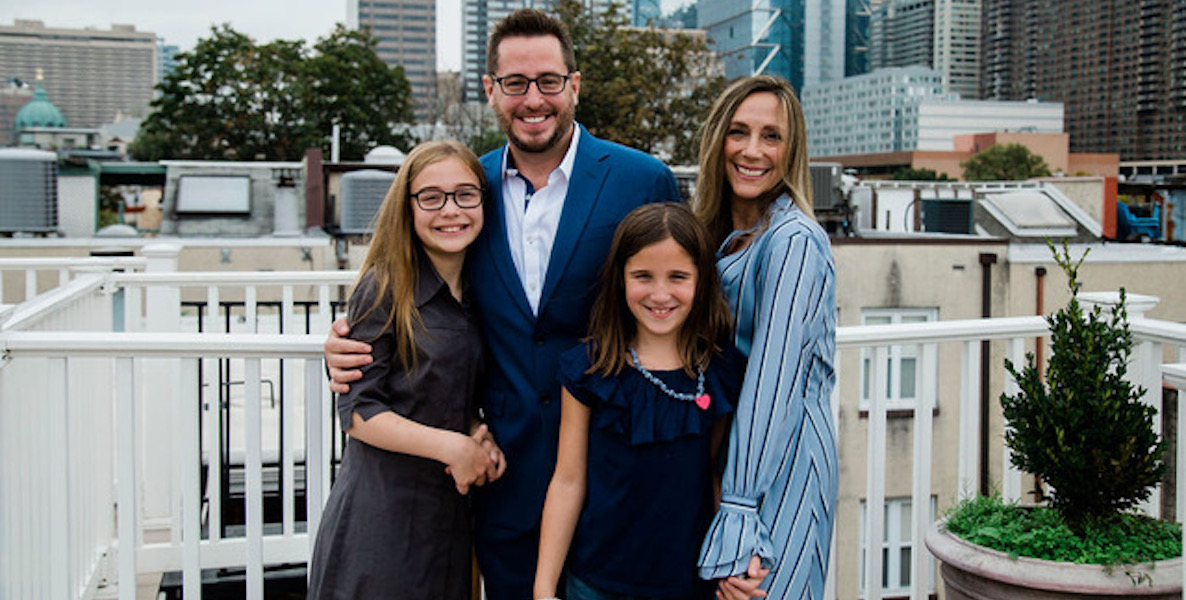Back when City Council at-Large candidate Drew Murray was a Democrat, he says he was often labeled a “DINO” — Democrat in Name Only — for being what he calls a “free market capitalist.” Now, as a Republican, he hears much the same criticism, from the other side.
“People say I’m a RINO [Republican in Name Only],” says Murray, a Fairmount resident who is making his second attempt at a City Council seat. “I take it as a compliment. It means I think for myself.”
Murray switched parties shortly after voting for Donald Trump in 2016 in the hopes that a Trump presidency would nudge Americans closer to the middle of the political spectrum. When that didn’t happen, he became something of an anachronism, at least in terms of national politics: a liberal Republican. Murray hopes to prevail in the Republican primary next week, and that his middle-of-the-road politics will appeal to enough Philadelphians in the general election to propel him into one of the three City Council seats reserved for minority party candidates.
Unlike his last attempt at winning a seat on Council in 2019, that means overcoming not just his fellow At-Large Republican candidates, but also those from the progressive Working Families Party, which four years ago elected its first member, Kendra Brooks, to Council. (Brooks will be on the ballot again in November.) Murray, though, sees a vacuum created by Republican David Oh resigning to run for mayor.
During the early part of his campaign, when Murray was seeking signatures to get on the ballot, he stopped in at a house in the Northeast in which the husband was a Republican and the wife, a Democrat. After he laid out his platform — around crime, and taxes, and education — the wife spoke up. “‘Drew, this is all common sense. It doesn’t seem Republican or Democrat,’” Murray recalls her saying.
“And that’s exactly right,” he adds. “That’s what we might be missing if we don’t get Republicans back on City Council. It’s why it’s important to look at moderate Republicans running in the general election, even if you don’t like what you see in the Republican Party nationally.”
Citizenship forged on the ground
A seat on City Council would be Murray’s first publicly elected position, but not his first foray into citizen engagement. That came several years ago, when he was one of the founders of the Friends of Coxe Park, in his Logan Square Neighborhood. A regional sales manager for O’Brien Systems, a company that stores artwork for museums when it is not on display, Murray mostly works from home. When his daughters were little, he picked them up from Greene Towne Montessori School every day at noon and took them to the small park on Cherry Street.
“It was falling apart, it was unsafe, it wasn’t being cleaned,” he says. “Turns out, it had fallen off the radar of Parks and Rec.”
Murray and a group of moms — “I was the token father among all these great women trying to do good for the community,” he said in 2019 — launched the park’s “Friends of” group, brought Coxe back to Parks and Rec’s attention, and got it on the list of projects that fell under the city’s Rebuild program, which is funded by the soda tax.
This was around the time Murray and his wife were facing the common conundrum among young parents in the city: to stay or to move to the suburbs, for better schools. Murray himself grew up outside the city, but attended St. Joe’s Prep, which produced our last two mayors. He followed in the footsteps of his father, grandfather and uncles at The Prep — and he says he has always taken to heart the school’s message to live your life as a man for others.
He had started attending Logan Square Neighborhood Association (LSNA) meetings and was approached by a neighbor, Rob Stuart, who convinced him to stay in the city, and join the LSNA board. Stuart, a civic leader and activist, passed away soon after; Murray joined the board, and eventually became president, in his late friend’s honor. He is also a member of the Center City District board, and is chair of the Philadelphia Crosstown Coalition, an association of Registered Community Organizations (RCOs) across the city. “I’m the only Republican in the room, and it says something that I’m the one they chose to be chair,” he says.
In part, that’s a result of his ability to bring people together across different neighborhoods, with different priorities, and different politics, says Northern Liberties Neighbors Association President Jeff Hornstein, who preceded Murray as Crosstown’s chair. “Drew is the kind of guy who actually does stuff,” Hornstein says. “He’s organized, he’s very disciplined, he runs a really good meeting and he has great relationships across the spectrum.”
This has come through in the way he has grown Crosstown, to more than 40 different RCOs across the city, and in his willingness to invite speakers to address the group ranging from super progressive former City Councilmember and mayoral candidate Helen Gym, to Republican City Controller Seth Bluestein, to former City Councilmembers (and also mayoral hopefuls) David Oh and Allan Domb. “Drew is good at finding places where we can agree and do stuff together, and pushing it along,” says Hornstein. “He’s a big step up for the Republican Party.”
As a 5th District resident, Murray has worked closely with his Councilmember, President Darrell Clarke, who announced he is stepping down at the end of the year. Murray considered, briefly, running for Clarke’s seat — especially as all but one of the contenders on the Democratic side were eliminated from the running because of challenges to their campaign petitions — but realized the math didn’t make sense: With an 8-to-1 citywide registration advantage, any Democrat is all but guaranteed to win in Center City. And to his credit, he refused friends’ suggestions that he switch parties again for the sake of political expediency.
“We collect enough taxes.”
Many of Murray’s ideas are similar to those he espoused in 2019, including an opposition to the tax on sugary beverages, which he contends is bad for Philly grocery stores and a burden on poorer Philadelphians. The difference this time, he notes, is in how the city has changed. “Crime has always been an issue, but in 2019 it was not number one on people’s list,” he says. “Now it’s number 1, 2 and 3.”
Still, Murray’s most specific policy ideas center around taxes: In addition to slowly reducing, then eliminating, the soda tax, Murray favors lowering the wage and other business taxes, as well as the real estate transfer tax, a one-time fee imposed by municipalities when properties change hands. “The transfer tax in Bucks County is 2 percent,” Murray says. “In Philadelphia, it’s 4.27 percent” — including 1 percent that goes to the state. “That’s a barrier to entry for people looking for affordable housing.”
But Murray is also adamant about continuing Rebuild to renovate city parks and increasing access to universal pre-K, both funded in part by the soda tax. To do that, and accommodate for less revenue coming in through real estate and business taxes, Murray would sponsor legislation that mandates the City use zero-based budgeting to determine its expenditures. That means, essentially, starting every department’s budget at zero, and then building out how much they need to complete their functions, rather than just carrying over potentially bloated expenses year after year.
Mayor Jim Kenney promised zero-based budgeting in his first mayoral campaign, then backed off — perhaps because of the politically unpopular prospect of eliminating City jobs. On the other hand, Governor Josh Shapiro, when he was a Montgomery County Commissioner, used zero-based budgeting to cut overall spending by 10 percent, while increasing investment in human services, education and public safety. That’s how Murray sees the process working for Philly.
“We collect enough taxes,” he says. “The money is there. We just need to be more efficient.”
As a Councilmember-at-Large, Murray’s purview would be citywide, not community-specific, but Hornstein notes that his experience both in Logan Square and Crosstown Coalition gives him a particular perspective that is important to making policy. “Drew can be the guy who highlights neighborhood issues that matter to everyday Philadelphians, a lot,” he says. “He’s a real neighborhood voice.”
The Citizen is writing about Philadelphia City Council candidates who are doing what for a long time was the unthinkable: bucking the system by running for office with ideas and experience — not just by dint of being the usual suspects. Because if there’s one thing we need more of, it’s this: more people paying more attention to our local politics, running for office, offering solutions and prepping to bring about much-needed change.
 Lead support for Every Voice, Every Vote is provided by the William Penn Foundation, with additional funding from The Lenfest Institute, Peter and Judy Leone, the John S. and James L. Knight Foundation, Harriet and Larry Weiss, and the Wyncote Foundation, among others.
Lead support for Every Voice, Every Vote is provided by the William Penn Foundation, with additional funding from The Lenfest Institute, Peter and Judy Leone, the John S. and James L. Knight Foundation, Harriet and Larry Weiss, and the Wyncote Foundation, among others.
![]() MORE ON CITY COUNCIL ELECTIONS FROM THE CITIZEN
MORE ON CITY COUNCIL ELECTIONS FROM THE CITIZEN



